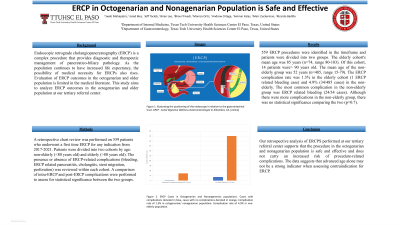Sunday Poster Session
Category: Interventional Endoscopy
P0836 - ERCP in Octogenarian and Nonagenarian Population Is Safe and Effective
Sunday, October 22, 2023
3:30 PM - 7:00 PM PT
Location: Exhibit Hall

Has Audio

Swati Mahapatra, DO
Texas Tech University of Health Sciences
El Paso, TX
Presenting Author(s)
Swati Mahapatra, DO1, Jared Bies, DO2, Jeff Angelo Taclob, MD3, Brian Lee, DO3, Bhavi Trivedi, MD3, Monica Ortiz, BS1, Andrew Ortega, MD2, Ammar Kalas, MD2, Marc Zuckerman, MD3, Ricardo Badillo, MD3
1Texas Tech University of Health Sciences, El Paso, TX; 2Texas Tech, El Paso, TX; 3Texas Tech University Health Sciences Center, El Paso, TX
Introduction: Endoscopic retrograde cholangiopancreatography (ERCP) is a complex procedure that provides diagnostic and therapeutic management of pancreatico-biliary pathology. As the population continues to have increased life expectancy, the possibility of medical necessity for ERCPs also rises. Evaluation of ERCP outcomes in the octogenarian and older population is limited in the medical literature. This study aims to analyze ERCP outcomes in the octogenarian and older population at our tertiary referral center.
Methods: A retrospective chart review was performed on 559 patients who underwent a first time ERCP for any indication from 2017-2021. Patients were divided into two cohorts by age: non-elderly (< 80 years old) and elderly ( >80 years old). The presence or absence of ERCP-related complications (bleeding, ERCP related pancreatitis, cholangitis, stent migration, perforation) was reviewed within each cohort. A comparison of intra-ERCP and post-ERCP complications were performed to assess for statistical significance between the two groups.
Results: 559 ERCP procedures were identified in the timeframe and patients were divided into two groups. The elderly cohort's mean age was 85 years (n=74, range 80-103). Of this cohort, 14 patients were > 90 years old. The mean age of the non-elderly group was 52 years (n=485, range 15-79). The ERCP complication rate was 1.3% in the elderly cohort (1 ERCP related bleeding case) and 4.9% (34/485 cases) in the non-elderly. The most common complication in the non-elderly group was ERCP related bleeding (24/34 cases). Although there were more complications in the non-elderly group, there was no statistical significance comparing the two (p=0.7).
Discussion: Our retrospective analysis of ERCPS performed at our tertiary referral center supports that the procedure in the octogenarian and nonagenarian population is safe and effective and does not carry an increased risk of procedure-related complications. The data suggests that advanced age alone may not be a strong indicator when assessing contraindication for ERCP.

Disclosures:
Swati Mahapatra, DO1, Jared Bies, DO2, Jeff Angelo Taclob, MD3, Brian Lee, DO3, Bhavi Trivedi, MD3, Monica Ortiz, BS1, Andrew Ortega, MD2, Ammar Kalas, MD2, Marc Zuckerman, MD3, Ricardo Badillo, MD3. P0836 - ERCP in Octogenarian and Nonagenarian Population Is Safe and Effective, ACG 2023 Annual Scientific Meeting Abstracts. Vancouver, BC, Canada: American College of Gastroenterology.
1Texas Tech University of Health Sciences, El Paso, TX; 2Texas Tech, El Paso, TX; 3Texas Tech University Health Sciences Center, El Paso, TX
Introduction: Endoscopic retrograde cholangiopancreatography (ERCP) is a complex procedure that provides diagnostic and therapeutic management of pancreatico-biliary pathology. As the population continues to have increased life expectancy, the possibility of medical necessity for ERCPs also rises. Evaluation of ERCP outcomes in the octogenarian and older population is limited in the medical literature. This study aims to analyze ERCP outcomes in the octogenarian and older population at our tertiary referral center.
Methods: A retrospective chart review was performed on 559 patients who underwent a first time ERCP for any indication from 2017-2021. Patients were divided into two cohorts by age: non-elderly (< 80 years old) and elderly ( >80 years old). The presence or absence of ERCP-related complications (bleeding, ERCP related pancreatitis, cholangitis, stent migration, perforation) was reviewed within each cohort. A comparison of intra-ERCP and post-ERCP complications were performed to assess for statistical significance between the two groups.
Results: 559 ERCP procedures were identified in the timeframe and patients were divided into two groups. The elderly cohort's mean age was 85 years (n=74, range 80-103). Of this cohort, 14 patients were > 90 years old. The mean age of the non-elderly group was 52 years (n=485, range 15-79). The ERCP complication rate was 1.3% in the elderly cohort (1 ERCP related bleeding case) and 4.9% (34/485 cases) in the non-elderly. The most common complication in the non-elderly group was ERCP related bleeding (24/34 cases). Although there were more complications in the non-elderly group, there was no statistical significance comparing the two (p=0.7).
Discussion: Our retrospective analysis of ERCPS performed at our tertiary referral center supports that the procedure in the octogenarian and nonagenarian population is safe and effective and does not carry an increased risk of procedure-related complications. The data suggests that advanced age alone may not be a strong indicator when assessing contraindication for ERCP.

Figure: Figure 1. ERCP Cases in Octogenarian and Nonangenerian populations. Cases with complications denoted in blue, cases with no complications denoted in orange. Complication rate of 1.3% in octogenarian/ nonagenarian population. Complication rate of 4.9% in non-elderly population.
Disclosures:
Swati Mahapatra indicated no relevant financial relationships.
Jared Bies indicated no relevant financial relationships.
Jeff Angelo Taclob indicated no relevant financial relationships.
Brian Lee indicated no relevant financial relationships.
Bhavi Trivedi indicated no relevant financial relationships.
Monica Ortiz indicated no relevant financial relationships.
Andrew Ortega indicated no relevant financial relationships.
Ammar Kalas indicated no relevant financial relationships.
Marc Zuckerman indicated no relevant financial relationships.
Ricardo Badillo indicated no relevant financial relationships.
Swati Mahapatra, DO1, Jared Bies, DO2, Jeff Angelo Taclob, MD3, Brian Lee, DO3, Bhavi Trivedi, MD3, Monica Ortiz, BS1, Andrew Ortega, MD2, Ammar Kalas, MD2, Marc Zuckerman, MD3, Ricardo Badillo, MD3. P0836 - ERCP in Octogenarian and Nonagenarian Population Is Safe and Effective, ACG 2023 Annual Scientific Meeting Abstracts. Vancouver, BC, Canada: American College of Gastroenterology.
